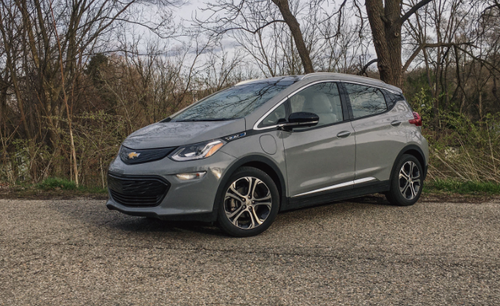GM Issues Second Recall In A Year For Chevy Bolt After Battery Fires
While somewhere a Tesla is spontaneously combusting with nary an acknowledgement from Elon Musk, GM is once again recalling some of its Bolt EVs – for the second time this year – due to a potential fire risk.
On Friday the company announced that two Bolts had caught fire without impact recently and that at least one of the two was related to the battery and happened despite the owner getting a fix from a previous recall, according to the Detroit Free Press.
The recall includes all Bolt EVs from 2017 to 2019, encompassing 68,000 vehicles. 50,925 of those vehicles were located in the U.S. and they have batteries that are produced at LG Chem’s Ochang, South Korea, facility, the report notes.
A spokesman for GM said: “As part of GM’s commitment to safety, experts from GM and LG have identified the simultaneous presence of two rare manufacturing defects in the same battery cell as the root cause of battery fires in certain Chevrolet Bolt EVs. As part of this recall, GM will replace defective battery modules in the recall population. We will notify customers when replacement parts are ready.”

GM is recommending that current owners:
- Return the vehicle to the 90% state of charge limitation using Hilltop Reserve mode (for 2017-2018 model years) or Target Charge Level mode (for 2019 model year), or visit a dealer to make that change.
- Charge the vehicle after each use and avoid depleting the battery below 70 miles of remaining range.
- Park the vehicle outside immediately after charging and do not leave the vehicle charging overnight.
- Customers who have not received the advanced diagnostics software should visit their dealer to get the update. After obtaining the software, limit the state of charge to 90% and follow the advice above.
Recall back in November of 2020, tens of thousands of Chevrolet Bolt vehicles were recalled after the company became aware of “five fires involving the cars” that resulted in two injuries from smoke inhalation.
A notice was issued in November for 50,932 of the vehicles in the U.S. dating from 2017 to 2019. General Motors said the battery could “catch fire when charged to full or nearly full capacity,” at the time.
As a temporary fix, the company said it would be reprogramming its battery’s “hybrid propulsion control module 2” to only allow charging to 90%. This fix clearly looks as though it didn’t work and the company will likely now be forced to take more drastic measures.
Tyler Durden
Fri, 07/23/2021 – 13:50
via ZeroHedge News https://ift.tt/3ByIB8D Tyler Durden